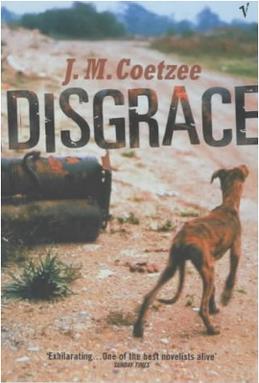Disgrace
Disgrace is a novel by South African author J.M. Coetzee, published in 1999. It won the Booker Prize that year, marking Coetzee's second win for this prestigious award. The novel is set in post-apartheid South Africa and explores themes of personal and national disgrace, social change, and the complexities of power dynamics in human relationships.
Plot Summary[edit | edit source]
The story follows David Lurie, a middle-aged professor at a Cape Town university who is dismissed for an affair with a student. Disgraced and isolated, Lurie retreats to his daughter Lucy's farm in the Eastern Cape. Here, the narrative delves into the changing social landscape of South Africa, as Lurie and Lucy become victims of a violent attack, which further complicates their relationship and their understanding of their place in the new South Africa.
Themes and Analysis[edit | edit source]
Disgrace is rich in themes that are critical to understanding post-apartheid South Africa. The novel examines the concept of disgrace on both a personal and societal level. Lurie's fall from grace mirrors the broader societal shifts occurring in the country, highlighting the challenges of reconciliation and forgiveness in a society grappling with the legacies of apartheid.
The novel also explores the dynamics of power and privilege, particularly in the context of gender and race. Lurie's relationships with women, including his daughter, are central to this exploration, as is the racial tension that underpins the violent attack on Lucy's farm. Coetzee uses these relationships to critique the historical injustices in South Africa and to question the possibility of moral redemption.
Reception[edit | edit source]
Disgrace received widespread critical acclaim upon its publication. Critics praised Coetzee's sparse yet powerful prose and his unflinching examination of complex social issues. The novel's portrayal of a changing South Africa was particularly noted for its insight and depth. However, Disgrace also sparked debate, with some readers and commentators questioning its portrayal of race and gender relations.
Legacy[edit | edit source]
Disgrace is considered one of J.M. Coetzee's masterpieces and a significant work in the canon of post-apartheid South African literature. It has been studied extensively in literary courses around the world and has contributed to ongoing discussions about South Africa's national identity and the process of reconciliation. The novel's impact extends beyond literature, influencing debates in social and political spheres about power, privilege, and the legacy of apartheid.
This article is a literature-related stub. You can help WikiMD by expanding it!
Search WikiMD
Ad.Tired of being Overweight? Try W8MD's physician weight loss program.
Semaglutide (Ozempic / Wegovy and Tirzepatide (Mounjaro / Zepbound) available.
Advertise on WikiMD
|
WikiMD's Wellness Encyclopedia |
| Let Food Be Thy Medicine Medicine Thy Food - Hippocrates |
Translate this page: - East Asian
中文,
日本,
한국어,
South Asian
हिन्दी,
தமிழ்,
తెలుగు,
Urdu,
ಕನ್ನಡ,
Southeast Asian
Indonesian,
Vietnamese,
Thai,
မြန်မာဘာသာ,
বাংলা
European
español,
Deutsch,
français,
Greek,
português do Brasil,
polski,
română,
русский,
Nederlands,
norsk,
svenska,
suomi,
Italian
Middle Eastern & African
عربى,
Turkish,
Persian,
Hebrew,
Afrikaans,
isiZulu,
Kiswahili,
Other
Bulgarian,
Hungarian,
Czech,
Swedish,
മലയാളം,
मराठी,
ਪੰਜਾਬੀ,
ગુજરાતી,
Portuguese,
Ukrainian
Medical Disclaimer: WikiMD is not a substitute for professional medical advice. The information on WikiMD is provided as an information resource only, may be incorrect, outdated or misleading, and is not to be used or relied on for any diagnostic or treatment purposes. Please consult your health care provider before making any healthcare decisions or for guidance about a specific medical condition. WikiMD expressly disclaims responsibility, and shall have no liability, for any damages, loss, injury, or liability whatsoever suffered as a result of your reliance on the information contained in this site. By visiting this site you agree to the foregoing terms and conditions, which may from time to time be changed or supplemented by WikiMD. If you do not agree to the foregoing terms and conditions, you should not enter or use this site. See full disclaimer.
Credits:Most images are courtesy of Wikimedia commons, and templates, categories Wikipedia, licensed under CC BY SA or similar.
Contributors: Prab R. Tumpati, MD

